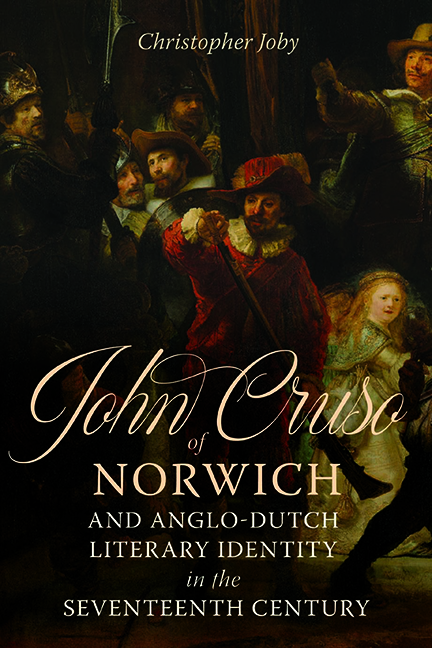Book contents
- Frontmatter
- Dedication
- Contents
- List of illustrations
- Acknowledgements
- Author’s note
- Abbreviations
- Prologue
- 1 Intrat John Cruso
- 2 John Cruso’s school days
- 3 John Cruso’s early adult life
- 4 Cruso’s elegy to Simeon Ruytinck (1622)
- 5 Cruso the English poet
- 6 1632 – Cruso’s annus mirabilis
- 7 Cruso the translator
- 8 Cruso’s 1642 Dutch verses: praise and lamentation
- 9 Cruso and the English Civil Wars
- 10 Cruso the Epigrammatist
- 11 Cruso’s final years
- Epilogue
- Appendix 1 Poems by John Cruso
- Appendix 2 Liminary verses in John Cruso’s English publications
- Bibliography
- Index
- Studies in Renaissance Literature
- Frontmatter
- Dedication
- Contents
- List of illustrations
- Acknowledgements
- Author’s note
- Abbreviations
- Prologue
- 1 Intrat John Cruso
- 2 John Cruso’s school days
- 3 John Cruso’s early adult life
- 4 Cruso’s elegy to Simeon Ruytinck (1622)
- 5 Cruso the English poet
- 6 1632 – Cruso’s annus mirabilis
- 7 Cruso the translator
- 8 Cruso’s 1642 Dutch verses: praise and lamentation
- 9 Cruso and the English Civil Wars
- 10 Cruso the Epigrammatist
- 11 Cruso’s final years
- Epilogue
- Appendix 1 Poems by John Cruso
- Appendix 2 Liminary verses in John Cruso’s English publications
- Bibliography
- Index
- Studies in Renaissance Literature
Summary
Who was John Cruso? It has been the aim of this book to try to answer this question. This epilogue summarizes what we have learnt about Cruso, and places him in a wider research context. We must begin by acknowledging that there are still gaps in our knowledge about him. Details of his early years are sketchy, as are those of his final years. We lack manuscripts that would help us understand how Cruso went about his work as an author of Dutch and English literary works. We have one or two private letters, but no extensive correspondence in the manner of, say, Sir Thomas Browne or Constantijn Huygens with which to build a picture of Cruso's everyday life, or to go behind the scenes, to pick up the theatre metaphor once more. Although we are usually in no doubt as to which works he did write, he often hid, at least partially, behind his onymat cryptique, I.C. So, in some sense, Cruso remains a somewhat elusive figure, in the wings rather than centre-stage. Nevertheless, his published works and the many archival records in which his name appears, have allowed us to build quite a detailed account of his life.
An important guiding principle in Cruso's life was civic humanism, an idea that emerged in Renaissance Florence, which placed an emphasis on the active life rather than a contemplative life. Cruso most certainly led an active life, and while he often employed il tropo castiglianesco of ‘idle hours’ rhetorically, he is likely to have had few such hours in reality. He was a merchant, hosier, paterfamilias, militia captain, church elder, friend, translator, and author. For much of his life, he was accompanied near and far by his brother Timothy, whose life followed a similar pattern as a merchant, father, militia man, and deacon.
John was clearly a successful merchant and hosier. The fact that as a hosier he financed the production process marks him as an early capitalist and allowed him to accrue wealth. He was one of more than thirty Strangers who worked as hosiers in early seventeenth-century Norwich. This, of course, not only made them wealthy, but also helped to restore the city's fortunes. Cruso's success allowed him to move to one of the highest-rated houses in the wealthiest parish in Norwich, St Peter Mancroft.
- Type
- Chapter
- Information
- Publisher: Boydell & BrewerPrint publication year: 2022



